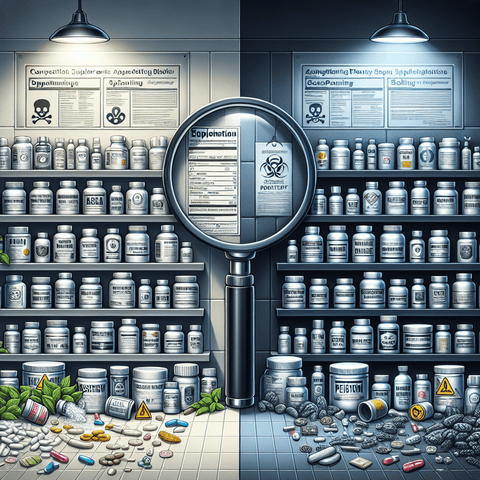What are the Best Supplements to Take Before and After Blood Tests?
Introduction
Blood tests are an essential tool in modern healthcare, used to monitor overall health, diagnose potential medical conditions, and assess levels of critical nutrients and biomarkers. Whether you're checking your cholesterol, evaluating your vitamin D status, or monitoring glucose levels, the accuracy of your results is vital for guiding your health decisions. While many individuals take dietary supplements for wellbeing, not everyone realizes that these supplements can interact with blood test results—sometimes enhancing accuracy, but often skewing outcomes if not managed properly.
This blog post is designed to provide readers with science-backed insights into which nutritional supplements are safe and beneficial to take before and after blood tests, as well as which ones should be avoided. We’ll explore how certain vitamins like B12, D, and C may support optimal levels if taken to address deficiencies. We’ll also discuss supplements that can cause testing anomalies, including biotin, high-dose antioxidants, and herbal supplements.
Importantly, this post is grounded in nutritional supplement information only. It does not replace medical advice or address prescription medications. Always consult with your healthcare provider and follow their test preparation guidelines.
Read on to discover how to optimize your supplement intake around blood tests—whether you want more accurate results, faster recovery post-draw, or just want to make sure you're doing it right the next time you visit the lab. And when you're ready, visit topvitamine.com for high-quality, lab-tested supplements tailored to your wellness goals.
Supplements Before Blood Test: What You Should Know
Preparing for a blood test isn't just about fasting or staying hydrated—it's also about making informed decisions regarding your supplement use. Nutritional supplements, particularly those rich in vitamins, minerals, and botanicals, can influence biomarker levels in various ways. In some cases, they may even interfere with how lab analyzers detect specific compounds. Understanding what to take—or avoid—before your test can make the difference between an accurate diagnostic outcome and a misinterpretation.
The general rule when approaching blood tests is to follow the advice given by your healthcare provider. But as a precaution:
- If your blood test includes nutrient panels, continuing a supplement up to test day might inflate levels, making it appear there’s no deficiency when one exists.
- On the other hand, people already diagnosed with a deficiency may be advised to continue their supplements to monitor progress.
Different types of blood tests react differently to supplements:
- Vitamin and Mineral Panels: Directly affected by the dosage and timing of supplement intake, particularly for vitamins like B12, D, and folate.
- Cholesterol and Liver Function Tests: Can be altered by omega-3 fatty acids, antioxidant levels, and some herbal supplements like milk thistle or garlic.
- Hormonal Panels and Thyroid Function: Supplements containing biotin (Vitamin B7), maca, or ashwagandha could affect readings.
Preparation largely depends on your goals for the blood test. If you aim to identify deficiencies, short-term intake may mask the real picture. If you want to evaluate progress during supplementation, it might be wise to continue your current regimen.
Some general recommendations for pre-test supplement routines include stopping high-dose supplements 24–48 hours before testing unless instructed otherwise. Long-term daily supplementation—over weeks or months—offers a more stable and reliable influence on nutrient levels compared to mega-doses taken only a day or two before the test.
Best Vitamins Before Blood Test: Supporting Optimal Nutrient Levels
If you're continually supplementing key micronutrients, you are more likely to score within optimal ranges for various nutrient-specific biomarkers. However, manipulating intake to 'boost your numbers' right before a lab draw is discouraged. Instead, focus on long-term supplementation that maintains homeostasis. The following nutrients are commonly evaluated in standard blood panels and represent some of the top supplements for pre-test consistency.
Vitamin D: Essential for immune regulation, bone integrity, and inflammatory response, vitamin D is frequently measured in blood tests. Deficiencies are common, especially in geographic regions with limited sun exposure. Supplementation typically includes D3 (cholecalciferol) in doses ranging from 1000 IU to 4000 IU per day. To ensure accuracy, stop taking it 24 hours before a blood draw if the test aims to identify deficiency. Still, aim for consistent daily intake leading up to the test. Need reliable options? Find top-quality selections on our Vitamin D product page.
Vitamin B12: Critical for red blood cell formation, neurological function, and energy metabolism, Vitamin B12 is commonly assessed in groups at risk of deficiency (e.g., vegetarians, elderly, or those with absorption issues). Because serum levels are influenced by immediate intake, taking B12 too close to testing may temporarily elevate levels. Hold supplements for 12–24 hours unless otherwise directed.
Vitamin C: While not commonly tested directly, it can impact inflammatory markers such as C-reactive protein (CRP) and influence iron absorption. Antioxidant-rich, water-soluble, and generally well tolerated, Vitamin C supplementation is typically recommended for daily immune support. Limiting intake the night before or morning of testing might be prudent if undergoing inflammation or oxidative stress panels. Visit our Vitamin C collection for options suitable for long-term support.
Timing and dosage matter. While short-term “boosting” before a test often does more harm than good, regular daily intake maintained over weeks provides a truer picture of your nutrient status. It’s also worth considering whether the nutrient being measured is stored (fat-soluble) or rapidly cleared (water-soluble), as this affects blood saturation and test reliability.
Fasting Blood Test Supplements: What’s Safe to Take and What to Avoid?
Fasting before a blood test typically means not eating or drinking anything but water for 8 to 12 hours. But what about vitamins or minerals? The answer depends on both the supplement's composition and the tests being performed.
Supplements best avoided during fasting tests include those with caloric content, oils, carbs, or active compounds known to influence blood chemistry:
- Fish oils and omega-3s: While beneficial for cardiovascular health, their fat content may alter lipid panel results. Best to skip them for 12–24 hours pre-test. Check our full omega-3 assortments here.
- Multivitamins: Typically include a mix of fat-soluble and water-soluble compounds, often along with small amounts of sugar or binding agents. These should generally be withheld until after the test.
- Iron: This mineral may alter ferritin and hemoglobin readings. It should be consumed on an empty stomach for maximum absorption but may skew results if taken too close to sample collection.
Supplements that may be safe—or even beneficial—during a fasting window include:
- Electrolyte formulations without sugars or calories, especially those containing potassium, sodium, or magnesium.
- Magnesium in a non-chelated, non-caloric form—great for muscle relaxation and biochemical stability. Explore available formulations in our Magnesium section.
Nutritionists often recommend stopping all non-essential supplements 24 hours before a fasting test to eliminate any confounding variables. For long-term supplementation, this pause won’t significantly affect blood levels, but it can ensure truer insights into your metabolic health.
What Not to Take Before Blood Work: Supplements to Temporarily Avoid
Certain nutritional supplements are known to interfere directly with the assays used in clinical blood testing. Avoiding these prior to testing—especially within 24 to 72 hours—is essential for ensuring accurate and reliable results. Below is a curated list of supplements that should be temporarily paused before your blood draw.
Biotin (Vitamin B7): Used to support hair, skin, and nail health, biotin can interfere with immunoassay-based tests, especially those related to thyroid, reproductive hormones, and cardiac biomarker evaluation. The FDA advises stopping high-dose biotin (more than 10 mg/day) at least 72 hours before testing, though even regular doses may affect sensitive thyroid panels.
Vitamin E and A (High-dose): These fat-soluble vitamins are stored in body tissues and can influence liver enzyme readings and affect lipid metabolism markers. While low doses are unlikely to interfere, high-dose antioxidant regimens should be discontinued at least 48 hours prior to tests targeting liver or cardiovascular health.
Herbal Extracts like garlic, ginger, turmeric, ginseng, and ginkgo biloba, all contain bioactive expressions that may provoke anti-inflammatory or blood-thinning effects. This can influence coagulation panels, C-reactive protein scores, and liver enzymes. Stop herbals at least 48 hours pre-test unless told otherwise by your provider.
Other common supplements to approach with caution include St. John's Wort (known for serotonin modulation, which may affect mood or hormone panels), and activated charcoal or detox compounds, which may bind nutrients and alter chemical analysis.
It's important to review your entire supplement list with your lab technician or a qualified nutritionist to clarify which ingredients might require a short-term pause before blood testing. When in doubt, a conservative approach of holding supplements for 48–72 hours is typically advisable, unless doing so conflicts with a prescribed therapeutic program.
Supplements Affecting Blood Test Results: The Science Behind Supplement Interference
So how exactly do supplements interfere with lab results? The answer lies in how nutrients interact biologically with biomarkers and chemically with laboratory assay technologies. Blood measurements depend on various enzyme-based reactions, detection of fluorescent markers, and binding proteins—all of which can be altered by the influx of external vitamins or botanicals in the system.
Fat-soluble vitamins such as A, D, E, and K are stored in fatty tissues and metabolized slowly. As a result, even occasional high doses can inflate serum levels for days. For example, excessive supplemental vitamin K can mute coagulation marker abnormalities, hiding potential issues.
Water-soluble vitamins (e.g., B-complex and vitamin C) are rapidly metabolized and excreted. However, a mega-dose the night before could still spike serum levels unnaturally. This is particularly true for vitamins B6 and B12, where high intake shortly before testing can impair accurate classification between sufficiency and surplus.
Here is a quick-reference interference chart:
| Supplement | Affected Test | Recommended Action |
|---|---|---|
| Biotin | Thyroid Panel, Hormones | Stop 72 hours prior |
| Vitamin D | Inflammation Markers | Stop 24 hours before for diagnostic integrity |
| Omega-3 | Lipids, Liver Enzymes | Stop 12–24 hours pre-test |
| Herbal Extracts | Coagulation, Liver Function | Withhold for 48 hours |
| Iron | Ferritin, Iron Saturation | Hold for 24 hours or take as directed |
In short: Nutritional compounds can alter both biological expression and lab detection mechanisms. Transparency with healthcare providers and a few days of preparation can help avoid unnecessary diagnostic confusion.
Safe Supplements Before Blood Draw: What’s Okay to Take for General Wellness?
If you're focused on supporting general wellness leading up to your blood draw, there are certain supplements that are considered relatively “safe” to continue using. These do not typically interfere with blood results, provided that your test is not specifically measuring related biomarkers.
Magnesium: Well tolerated and beneficial for neurological calmness and electrolyte balance, magnesium supplementation is unlikely to distort blood test parameters unless you're specifically testing for serum magnesium levels. Our top-rated Magnesium products offer various forms such as glycinate and citrate for daily use.
Low-Dose Vitamin D: In a regular maintenance dose below 1000 IU/day, vitamin D may be acceptable to continue. However, consult your doctor if testing related hormone or calcium levels.
Probiotics: As they target gut bacteria integrity rather than blood biomarkers directly, probiotics are overwhelmingly safe to continue unless your healthcare provider advises testing specific microbiome-associated metabolites.
Collagen Peptides: If not undergoing an amino acid panel or bioavailable protein test, collagen or bone-broth-derived peptides are also safe to continue if they contain no additives, sugars, or caloric fillers.
Pairing your fasting test with appropriate hydration is critical, so clean, non-caloric electrolyte formulas may be used for hydration, provided they contain no added sugars or artificial stimulants. Aim for consistency rather than abrupt changes, and avoid trialing a new supplement within 48 hours of your lab draw to reduce unknown variables.
After the Blood Test: Supplement Strategies to Rebalance and Replenish
Once your blood test is completed, your supplement protocol can shift back to your usual wellness routine—or adapt based on what your test results reveal. If you were instructed to fast, abstain from supplements, or had multiple vials drawn, you may need to replenish lost nutrients or restore electrolytes.
First step? Hydration. Drinking water with a well-balanced electrolyte mix can normalize blood pressure and replenish any minor fluid shifts from the draw.
Second step: Strategic nutrient reintroduction:
- B-Complex Vitamins: Helps replenish energy metabolism, including B12 and B6, especially if you're recovering from fasting.
- Vitamin C: Supports oxidation and immune defense—especially helpful post-draw to support vascular recovery.
- Iron and Folate (if deficient): Start again in small increments post-test, aligning with medical advice.
Revisit your supplement plan post-results. If your test showed normal or elevated levels, you might not need ongoing supplementation. Conversely, deficiencies tell you to stay the course—or adjust dosage accordingly. Work with a nutritionist or your physician to refine your regimen based on evidence.
Conclusion
Managing your supplement intake before and after a blood test is just as important as the test itself. By understanding how specific vitamins, minerals, and herbal remedies impact lab precision, you can take a proactive stance in your own health monitoring. Always align with professional advice when in doubt, and remember: long-term supplementation decisions should be based on actual data, not guesswork.
For those looking to support nutrient balance, immunity, energy, or recovery—shop curated, high-quality options at topvitamine.com. Enhance your health journey with trustworthy products designed to integrate safely into your pre- and post-test routine.
Q&A Section
Q1: Can I take vitamin D before a blood test?
A: Yes, but if the test is measuring vitamin D status, you may need to stop 24 hours before the draw to avoid skewed results. Consult your provider for the best advice specific to your test goals.
Q2: Does biotin really affect lab results?
A: Yes. Biotin can interfere with thyroid, hormone, and cardiovascular marker panels. It is recommended to pause supplementation at least 72 hours before any related test.
Q3: What supplements are safe during fasting before blood tests?
A: Non-caloric electrolytes, some forms of magnesium, and possibly probiotics (with guidance) are generally considered safe. Avoid caloric or fat-based supplements like fish oil or multivitamins.
Q4: When can I resume supplements after a blood test?
A: Immediately afterward unless otherwise advised. If fasting, reintroduce key nutrients such as B-complex and iron slowly with food and water.
Q5: How do supplements impact blood panel accuracy?
A: Supplements can elevate or mask biomarker levels due to their nutrient content or interaction with lab assays. This is especially true for vitamins D and B12, biotin, antioxidants, and herbal extracts.
Important Keywords
- supplements before blood test
- best vitamins before blood draw
- fasting blood test supplements
- supplements to avoid before testing
- safe supplements pre blood test
- post blood test recovery supplements
- vitamin D blood test supplement
- biotin blood test interference
- omega-3 blood work
- magnesium supplements blood test



